"Atomic Habits - An Easy & Proven Way to Build Good Habits & Break Bad Ones" by James Clear
Developing healthy and long-lasting habits can help set your life on productive path. The power habits hold is more important than we imagine. Read on to find out more about power of atomic habits and we can use it to build good habits and break bad ones.
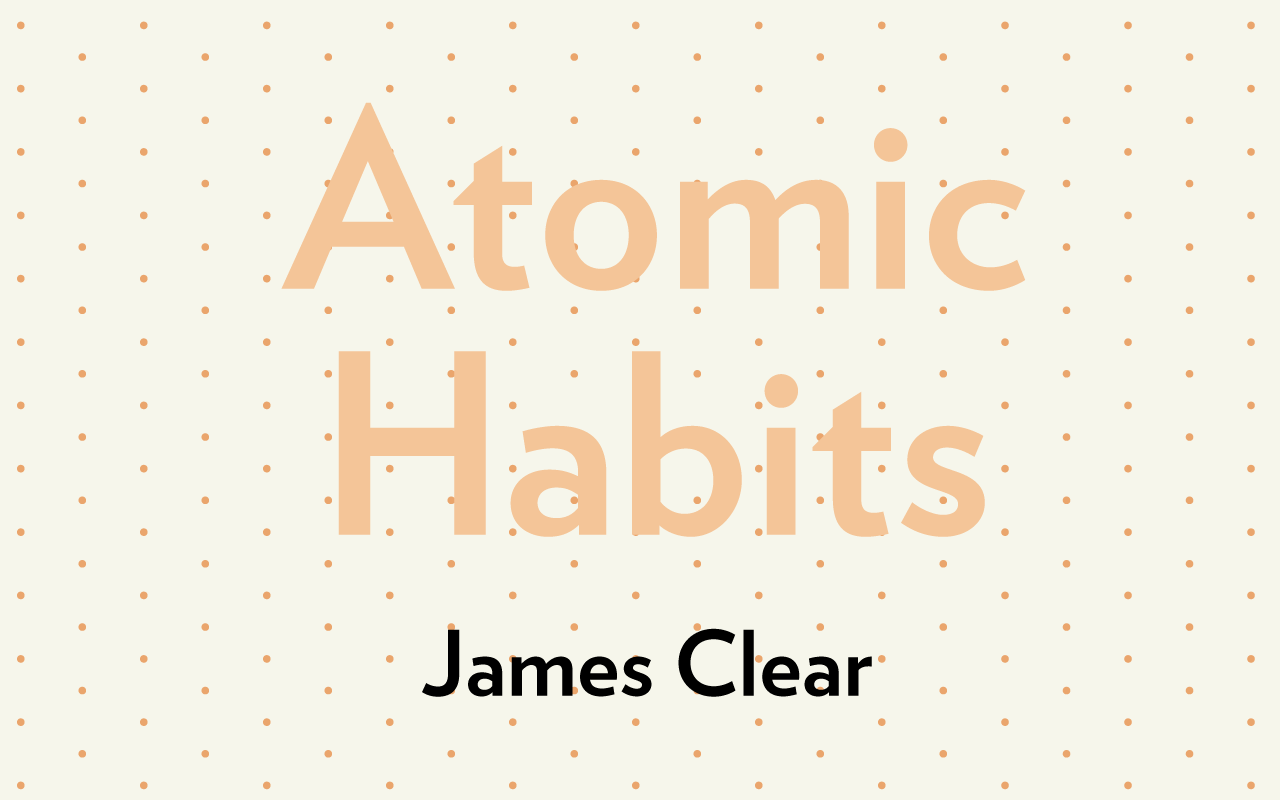
“The most effective way to change your habits is to focus not on what you want to achieve, but on who you wish to become.” - James Clear
When we think of changing our lives for the better, we are often told that we need to think big and make drastic changes to our lifestyle, routines, and thought processes.
Making these changes can be daunting, and too big of tasks to pull off. We do not think of or consider the fact that we can achieve major transformations through just small tweaks or adjustments to our daily routines, because doing that does not seem substantial enough.
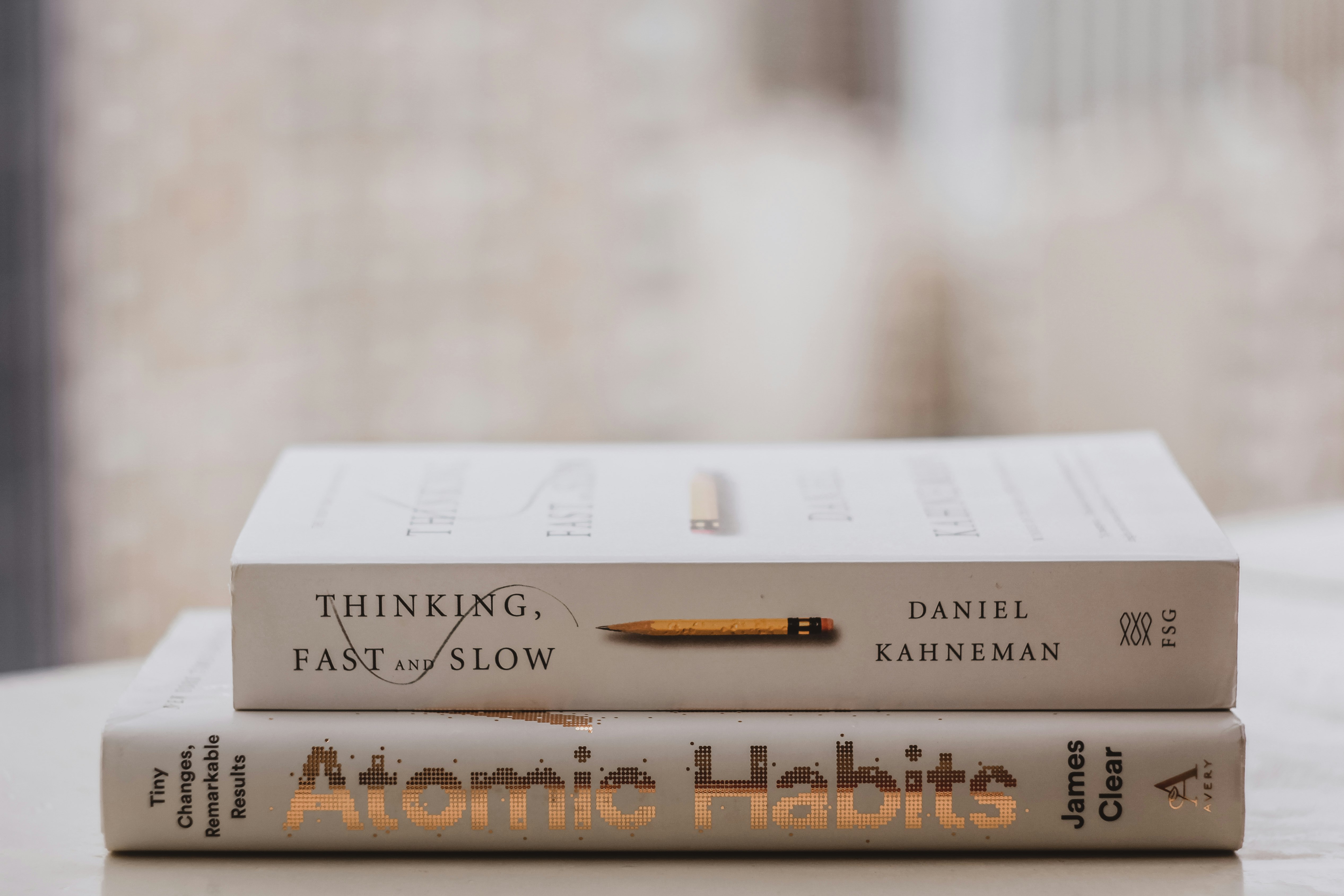
Photo by Lala Azizli on Unsplash
We tend to overestimate the importance of single, smaller actions, and underestimate the power of making small improvements repetitively over a period of time. But real change comes from the compound effects of many small changes, decisions, and habits that we make that over time, accumulate to create remarkable results.
Instead of making daunting changes to our everyday lives, we have to start thinking deeper; about changing lifestyles, identities and behaviors to lead more happier, positive, and productive lives.
This is where James Clear's take on the power and process of building good habits and breaking bad ones can help us understand how we can go about this.
The Power of Atomic Habits
James Clear's Atomic Habits book tackles the science and practical implications of how tiny habits and miniscule changes can grow into life-altering outcomes and help us lead healthier, happier and more productive lives. In Clear's Atomic Habits theorizations, he explains these outcomes to materialize from the 3 levels of behavior change: outcomes, process, and identity.
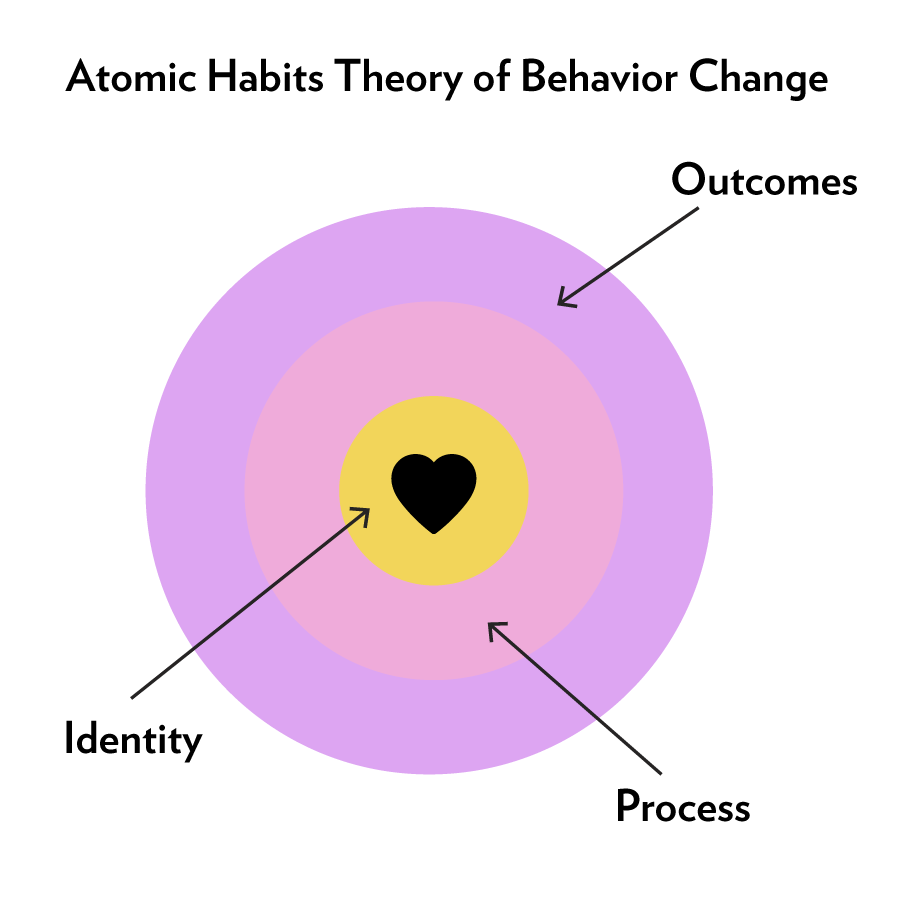
Clear also outlines 4 key insights to how we can harness the power of atomic habits and change our lives for the better:
- The "1%" rule
- Shifting our focus to systems instead of goals
- Focusing on our identities instead of outcomes
- Using the laws of behavior change to create good habits
The "1%" rule
Clear introduces the "1%" rule by explaining the power that small changes, amounting to about 1%, can alter our lives for the better over time. He talks about the about the power of these small changes compounding and amounting to something much greater.
Compounding can be amazingly powerful, both positive or negatively, if you lead it to develop over a period of time. If you can get 1% percent each day, we will get 37% about percent better over the course of a year. But if you deteriorate by 1% each day, you might find yourself at 0% after a year.
"Habits are the compound interest of self-improvement."

Photo by Ross Findon on Unsplash
Small habits do not seem to make much difference on a given day, but the impact over months or years can be substantial. We don't think of these small changes because it takes long to see results, but this applies to how we lead our lives on multiple levels. As a modern society, humans have been attuned to seek instant gratification. This makes it hard to focus on things that have long-term benefits. The slow rate of transformation also means that it is easy to let bad habits creep in, like allowing bad eating habits to take over for comfort, or something as simple as not drinking enough eater throughout the day. When we repeat these bad habits, they accumulate as manifest as larger problems.
"Time magnifies the margins between success and failure. It will multiply whatever you feed it, and good habits will make time your ally and bad habits make time your enemy."
James also outlines how he analyzes habits; through the plateau of latent potential. Habits do not seem to make a difference until you cross a critical threshold. Progress is believed to be linear, but the key aspect any compounding process is that the outcomes are delayed. This leads to an initial value of disappointment where we do not feel like we are making any progress, especially when the results do not follow the linear trajectory we expect. Many of us then tend to give up because we don't get the results we want
But we need to first acknowledge that it takes time and patience to build habits that can allow the compound interest of self-improvement to take hold and give us the results we want.
Shift your Focus to Systems instead of Goals
"The purpose of setting goals is to win again. The purpose of building systems is to continue playing the game."
Clear outline 4 main problems with how we have been going about goal-setting:
- Winners and losers have the same goals.
- Achieving a goal is only a momentary change.
- Goals restrict our happiness.
- Goals are at odds with long-term progress.
Reviewing your goals to make the journey meaningful, and tracking your progress towards them is what is important in keeping yourself motivated and accountable, and not the end results themselves. Apart from plotting your milestones, reminding yourself of your "why"s every now and then is key in your success as well. As you track your goals; that should be specific, measurable, achievable, realistic, and timed goals, and you're able to see and plot how much you've done, you'll be able to see how far you've come. You'll also be able to see if you're heading in the right direction, and if any adjustments need to be made.
To do this, you can consider using a habit tracker or by reflecting in a personal diary; tools that are available in the Journey app. Habit trackers can be used to mark off the days you've stuck to your plans and to your goals, and having a personal diary can provide you a space to reflect and recalibrate whenever need be when you set foot on a transformative path.

Clear posits that there is a point of contention between the idea of the system and the goal. If you continue your wasteful habits that lead to bad results, achieving a goal only changes out life for a brief moment. We get temporary results. Instead, what we need to change is the system that caused those results. There is also an implicit assumption behind every goal, that once you reach the goal, we will be happy. This causes us to keep putting off happiness until the next milestone, making achieving goals the source of happiness instead of the lifestyle change that the process can create for us.
Focus on your Identity and not the Outcome
"Identity change is the north star of habit change."
Most of us work by looking forward to just the outcomes of efforts, instead of how thinking about how we can make positive changes an intrinsic part of our identity. James identifies the problem with this sort of motivation by highlighting the key fact that the ultimate form of intrinsic motivation should be habit becoming a part of our identity.
When we solve problems for them to just manifest as outcomes and results, this plays out as a temporary fix. But when we look to solve problems at a deeper level, at the level of the systems, we change our identity.
He posits that we alter the way in which we process lifestyle changes. Many of us focus on the outcomes, which is concerned with changing the results, then the processes that are related to our habits and systems, and finally our identity, related to our beliefs. He suggests that we switch this order around to focusing on identity, processes, and then finally on outcomes.
The 4 Laws of Behavior Change
So how do we build these positive habits, and how do we overcome the detrimental ones?
Clear outline the process of building habits in 4 stages: cue, craving, response, and reward. The cue triggers the brain to initiate an action, the craving provides the motivational force, the response the action that we perform, and the reward is the end goal.
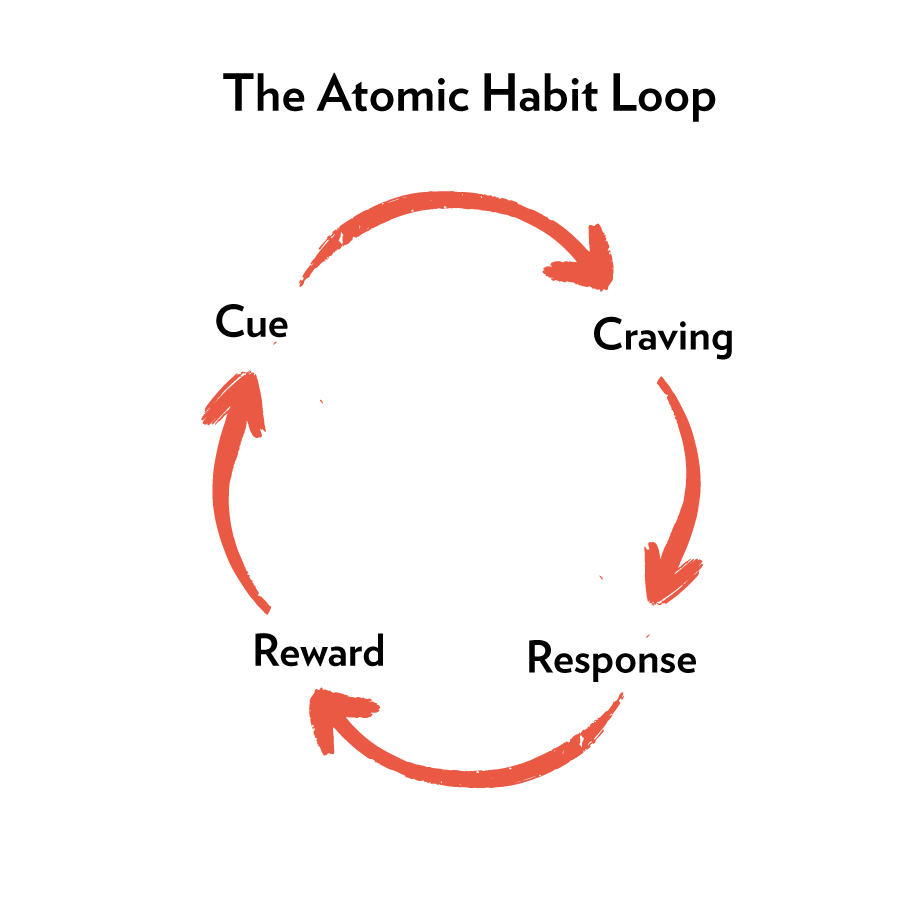
According to these stages, Clear has theorized 4 steps to creating good habits as well:
1. Make it obvious
This relates to designing our environment around our cues. Clear suggests that we put more steps between us and the bad habits and fewer steps between us and the good habits. Create an environment that exposes you to the cues to your good habits instead, to gently nudge us in the right direction every day
2. Make it attractive
Make the craving aspect of the good habit look attractive, to make the habits themselves attractive to help you stick to them.
3. Make it easy
The main aim of this step is to reduce the friction and prime our environment for the habits we would like to develop. Make your environment work for you. Keep healthy food within reach so you can eat them easily, avoid stocking up your fridge with unhealthy snacks, set your clock 10mins ahead of actual time so you do not run late, keep a bottle of water ready on your bedside table to have first thing in the morning; it's the small changes like this in your space that help you develop better habits.
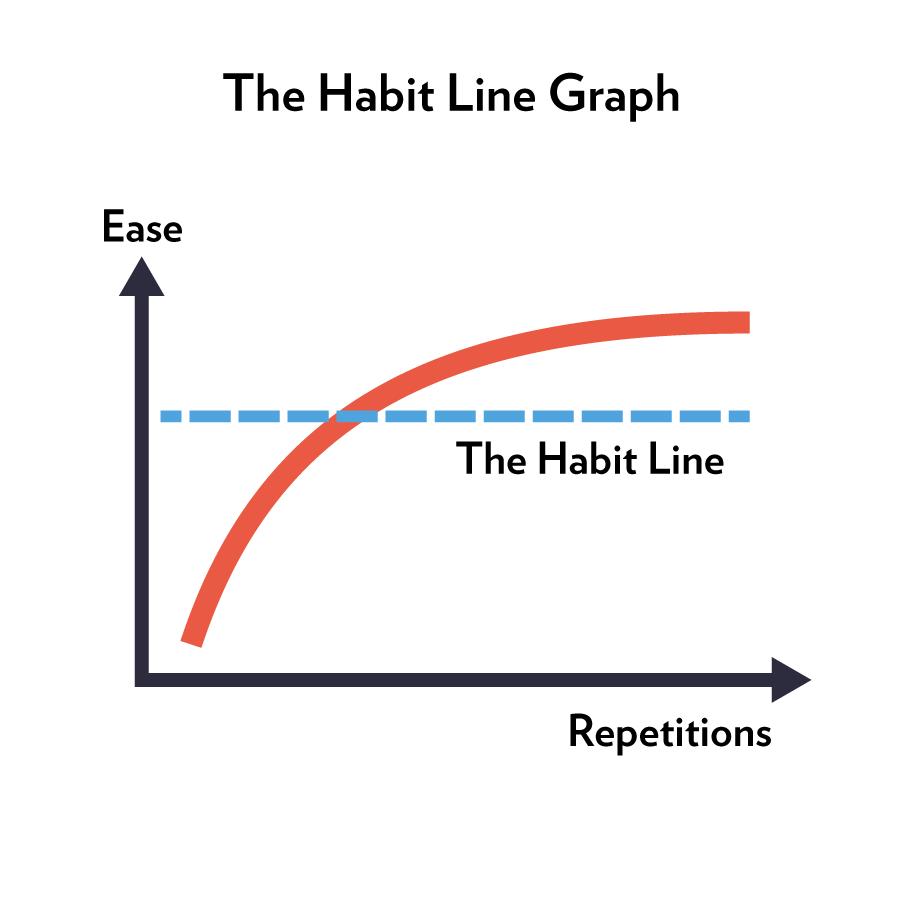
4. Make it immediately satisfying
Our brains have evolved to prioritize immediate rewards over delayed rewards. The cardinal rule of behavior change is what is immediately rewarded is repeated, and what is punished is avoided. We get short term bursts of dopamine from things like scrolling through Instagram mindlessly and from eating unhealthy food, making it more likely that we repeat these. Therefore, we need to try to attach some form of immediate gratification to make the habit immediately satisfying.
Overall, to be successful, we want to make sure our habits are obvious, attractive, easy and satisfying, and make our bad habits more difficult by making the cues invisible, the action unattractive and hard, and the reward unsatisfying.
We rarely stop to think about our own habits or plan for long-term change when we start a new routine or regimen, such as going to the gym or developing healthier eating habits. The great power in the idea of atomic habits is that it emphasizes systems rather than goals, identity rather than outcome, and the smaller and more miniscule habits rather than drastic change.
Turning your habits into a lifestyle and cementing them can be done with intentional habits like keeping track of your milestones and progress with a habit tracker, or by reflecting on how you feel throughout this period of change in a diary; both tools that can be found in one place on Journey. We may not know exactly how long it will take for us to develop a habit, because habits are not a finish line to cross but a lifestyle to live.
The key to keep in mind is that small habits compound. Atomic habits may be individually small and seemingly incapable of effecting substantial change. But the truth is that, collectively, and given time, they can hold remarkable power to make positive and lasting change to our lives.


